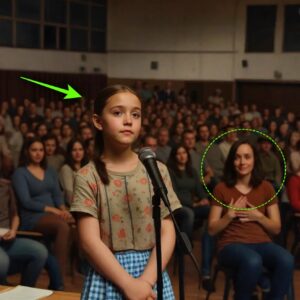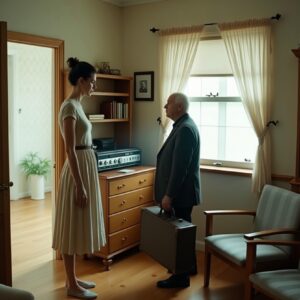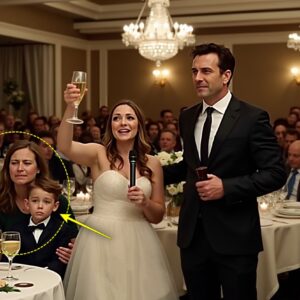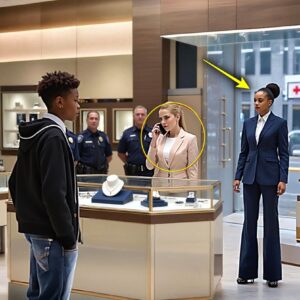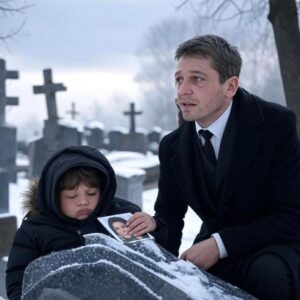When our parents died, I assumed Marcus and I would support each other. Instead, he dove headfirst into the family finances, emptying every account. The house, the savings—vanished in a single night. “This was the simplest solution,” he claimed, as if simplicity equated to fairness. Then he vanished, living lavishly while I struggled to make ends meet.
For years, there was silence.
Then, last month, the phone rang. A frail voice spoke.
“It’s Marcus,” he whispered. “I… I need your help.”
I should’ve ended the call. Should’ve let him face the consequences.
But I didn’t.
Now he’s in my spare room, gaunt and hollow-eyed, the man who stole my future now entirely reliant on me.
Last night, he murmured, “I’m sorry.”
For the first time, I looked at him and wondered—maybe this was my true inheritance.
But forgiveness? That’s still unclear.
Marcus had always been the favored one. The charmer who could talk his way out of anything with a smile and a joke. Growing up, I admired him. He was six years older, but it felt like a lifetime. While I struggled to find my place, Marcus glided through life effortlessly. Teachers adored him, girls swooned over him, and even Mom and Dad saw him as their pride and joy.
That’s why, when they died suddenly in that car crash, I thought we’d stay close. We were all each other had left. But grief changes people. For Marcus, it made him reckless. Within weeks, he was talking about selling the house. “We don’t need this place,” he said, dismissing my objections. “It’s too much to handle. Too many memories.”
What he really meant was: I want the money.
At first, I resisted. I argued, begged, even threatened legal action. But Marcus knew how to play dirty. He showed up at my small apartment one evening with signed documents, claiming it was all legal. “Trust me,” he said, handing me a $10,000 check. “This is your share.”
My share? It wasn’t enough to cover a year’s rent, let alone replace what he’d taken. When I confronted him, his expression hardened. “You’re not cut out for big decisions,” he snapped. “Just take the money and stop making this harder.”
That was the last time I saw him for five long years.
The call came late one night. I was on my couch, scrolling through social media, trying to distract myself from another lonely evening. The number was unfamiliar, but something made me answer.
“Hey, sis,” the voice rasped. It took me a moment to recognize it. Marcus sounded different—broken, almost. Not the confident brother I remembered.
“What do you want?” I asked, my tone sharper than I intended.
There was a pause. “I’m sick,” he admitted finally. “Cancer. Stage four. They gave me six months, maybe less if things go south.”
I froze, gripping the phone tighter. Part of me wanted to laugh bitterly. Karma, right? After everything he’d done, here he was calling me from rock bottom. But another part—the part that still remembered the boy who taught me to ride a bike—felt a pang of pity.
“I’m broke,” he continued. “No family except you. No friends either, honestly. Everyone’s moved on.”
“So you come crawling back to me?” I shot back, anger bubbling up. “After what you did?”
He sighed heavily. “Yeah. I deserve that. But… I don’t have anyone else. Please, just let me stay with you until…”
Until what? Until he got better? Until he died? He didn’t finish the sentence, but I understood.
Against every instinct screaming inside me, I agreed. Maybe it was guilt. Maybe it was because deep down, I still cared about him. Or maybe it was because taking care of someone felt like the only thing I was good at these days.
Having Marcus around again was… complicated. Physically, he was a shadow of his former self. His once-broad shoulders were now skeletal, and his skin had an unhealthy pallor. Emotionally, though, he was harder to read. Some days, he acted like the old Marcus—making jokes, teasing me about my cooking—but other times, he withdrew into himself, staring out the window for hours without saying a word.
One evening, after dinner, I found him sitting on the porch steps, staring at the stars. I hesitated before joining him, unsure if he wanted company.
“You ever think about them?” he asked quietly, nodding toward the sky. “Mom and Dad?”
“All the time,” I admitted. “Especially nights like this.”
He nodded slowly. “Me too. I keep wondering what they’d say if they saw me now.”
“They’d probably be disappointed,” I said bluntly. “Like I am.”
Marcus flinched but didn’t argue. “Fair enough. I messed up, okay? With the money, with you… with everything. I thought I was invincible back then. Thought I could fix anything. Turns out, I couldn’t even fix myself.”
His honesty caught me off guard. For the first time, I saw cracks in his armor. The Marcus I grew up with never admitted weakness. This version of him was raw, vulnerable—and strangely human.
A few weeks later, I discovered something unexpected. While cleaning out the attic, I stumbled upon an old shoebox filled with letters addressed to me. They were written in Marcus’s messy scrawl, dated during those five years we were estranged. Curious, I opened one.
Dear Riley,
I hope you’re doing okay. I hate that we ended things so badly. I wish I could explain why I did what I did, but truthfully, I don’t have a good excuse. I was selfish and scared, and I ruined the best relationship I ever had—you. If you’re reading this someday, please know I’m sorry. Truly sorry.
Tears blurred my vision as I read through more letters. In them, Marcus poured out his regrets, his fears, and even updates about his life. He talked about losing touch with old friends, struggling to find purpose, and feeling haunted by the choices he’d made. By the end of the box, I realized something shocking: Marcus hadn’t forgotten about me. He’d been thinking about me all along.
Armed with this new perspective, I approached Marcus differently. Instead of treating him as a burden, I started seeing him as a person—a flawed, hurting person who needed connection as much as I did. We began spending more time together, sharing stories and memories. Slowly, tentatively, we rebuilt our bond.
One day, as we sat side by side watching TV, Marcus turned to me with a serious expression. “Riley, there’s something I need to tell you.”
“What is it?” I asked, bracing myself.
“When I liquidated the assets, I didn’t spend it all on myself,” he confessed. “Most of it went into investments under fake names. I was planning to give you your half back someday… but then I got diagnosed, and I panicked. I sold everything off to pay for treatments.”
I stared at him, stunned. “Why didn’t you tell me sooner?”
“Because I didn’t want you to feel obligated to take care of me,” he admitted. “I wanted you to choose to help me—not out of guilt, but because you cared.”
Despite everything, I found myself smiling. “Well, mission accomplished, I guess.”
In the final weeks of his life, Marcus became reflective. He talked openly about death, not with fear, but with acceptance. One afternoon, as we flipped through an old photo album, he stopped on a picture of us as kids, grinning ear to ear at some long-forgotten birthday party.
“You know,” he said softly, “for all the mistakes I made, I’m glad I got to reconnect with you. You’re the best sister anyone could ask for.”
Tears welled up in my eyes. “And you’re the most infuriating brother,” I teased, squeezing his hand.
When Marcus passed away a week later, I felt a mix of emotions—sadness, relief, and gratitude. Though our reconciliation came too late to change the past, it gave us both closure. And in caring for him, I rediscovered a part of myself I thought I’d lost: compassion.
Looking back, I realize Marcus’s illness wasn’t just a test of forgiveness—it was a lesson in humanity. Life isn’t about holding onto grudges; it’s about letting go and finding meaning in the messiness. My inheritance wasn’t the money Marcus took—it was the chance to love unconditionally, flaws and all.
